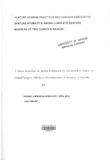| dc.contributor.author | Ndung'u, Mwasha M | |
| dc.date.accessioned | 2013-05-23T13:46:09Z | |
| dc.date.available | 2013-05-23T13:46:09Z | |
| dc.date.issued | 2010 | |
| dc.identifier.citation | Master of Dental Surgery (MDS) in Prosthodontics, | en |
| dc.identifier.uri | http://erepository.uonbi.ac.ke:8080/xmlui/handle/11295/24978 | |
| dc.description.abstract | Background: Studies have shown that one of the most common complications of
complete denture wearing is denture stomatitis with a prevalence rate of 11%-
75%. Though the aetiology is multifactorial, denture hygiene practices and
nocturnal denture wearing have been shown to contribute greatly to the condition.
Objective: To determine denture hygiene practices and Candida-associated
denture stomatitis among complete denture wearers at two clinics in Nairobi.
Study design: This was a descriptive cross-sectional study; the study sample
comprised of edentulous persons who had been treated at the UON School of
Dental Sciences and Kenyatta National hospital and were contacted through
telephone and/or post office mail and fulfilled the criteria.
Materials and method: An interviewer administered questionnaire was filled with
details on denture hygiene practices; denture cleanliness was assessed by
soaking the dentures in 5% erythosine and plaque was graded using the Budtz-
Jorgensen criteria of denture cleanliness; denture stomatitis was clinically
diagnosed and graded using the modified Newton's criteria by Budtz-Jorgensen
and swabs taken from the fitting surface of the denture and palatal mucosa were
cultured to assess the Candida colony types. A data collection form was used to
record the findings for denture cleanliness and Candida presence.
Data analysis and presentation: The Statistical Package for Social Sciences
(SPSS) 12.1 was used for data analysis. Descriptive analytical tests were carried
out to determine the frequency of various variables. Pearson's Chi square and
independent t-test was applied to test the hypothesis. The data was presented in
form of figures and tables.
Results: Data of 74 participants was included in the study. Duration of current
denture the participants were wearing ranged from 8 months to 24 years with a
mean denture age of 6.5 years. The main method of denture cleaning was
brushing and soaking in water by 66.2% of the participants while 18.9% soaked
in water only, 1.35% soaked in warm salty water and 13.5% brushed only. 51.4%
cleaned their dentures once a day, 45.9% more than once while 2.7% cleaned
occasionally. Denture cleanliness was excellent in 45.9%, fair in 44.6% and poor
in 9.5%. Nocturnal denture wearers were 33.8% and majority cleaned once a
day.
Forty five (60.8%) participants had either local 33.8%, diffuse 24.3% or granular
2.7% denture stomatitis. In the cultured specimens, higher Candidal carriage
occurred on the denture fitting surface than the palatal mucosa. The predominant
species was G.albicans followed by C.krusei. C.tropicalis was co-cultured in two
cases from the palatal mucosa. Positive mycological cultures were isolated in
higher proportions in participants with the highest grades of inflammation.
Conclusion: Within the limitations of this study, majority of the participants
reported brushing and soaking their dentures in water and none reported
chemical cleansing. Majority cleaned their dentures at least once a day.
The level of cleanliness of the dentures was considered inadequate for half of
the denture wearers. A third of the denture wearers reported nocturnal denture
wear. Prevalence of DS in this population is 60.8% with only a half of those with
DS had positive Candida cultures. G. albicans was the predominant species and
statistically significant associations were observed between denture hygiene
practices and positive Candida cultures. Significant association was observed
between the denture hygiene practices and denture stomatitis.
Recommendations: There is need to establish a health education program
aimed at improving denture hygiene practices among complete denture wearers
so as to reduce CDS. It is important for clinicians to advice denture wearers on
chemical cleansing as mechanical cleansing alone has not been shown to control
plaque accumulation on the denture surface.
Clinicians should reinforce avoidance of nocturnal denture wearing since it has
been significantly associated with positive Candida cultures and other studies
need to investigate the other aetiologic factors of OS as only half of those with OS
had positive Candida cultures. | en |
| dc.language.iso | en | en |
| dc.publisher | University Of Nairobi | en |
| dc.title | Denture hygiene practices and candida-associated Denture stomatitis among complete denture Wearers at two clinics in Nairobi | en |
| dc.type | Thesis | en |
| dc.description.department | a
Department of Psychiatry, University of Nairobi, ; bDepartment of Mental Health, School of Medicine,
Moi University, Eldoret, Kenya | |
| local.publisher | College of Health Sciences | en |

